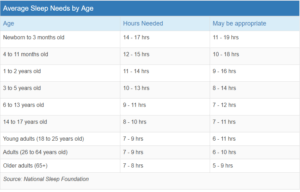I love sleep. I am a firm proponent of getting a solid 8 hours a night, so I assume I get enough of it. But how much sleep is really enough? The short answer is well, it depends. But here’s the long answer.
According to the national sleep foundation, “Sleep needs vary across ages and are especially impacted by lifestyle and health. To determine how much sleep you need, it’s important to assess not only where you fall on the “sleep needs spectrum,” but also to examine what lifestyle factors are affecting the quality and quantity of your sleep such as work schedules and stress.” So what is the sleep needs spectrum? Depending on our age, we need a different range of sleep. The NSF has a handy-dandy chart to help you pinpoint your range on the spectrum:

This Range Is Just That: A Range
Depending on your activity levels, weight, eating habits, and stress levels, you may find yourself on different sides of the sleep needs spectrum. If you find you are consistently fatigued during the day, check your category on the spectrum. Are you falling in the recommended sleep range for your age? If not, try to adjust your sleeping habits to fall somewhere on that range. If you are in the range and are still find yourself chronically fatigued, try to adjust yourself to a different end of the sleep spectrum. For instance, if you’re an always-tired 40 year old who is getting 10 hours of sleep a night, try to trim it down to 7 or 8. You may be oversleeping!
That being said, quantity of sleep isn’t the only thing that determines our sleep health. Making sure we get a quality sleep as often as possible is as important if not more so than the number of hours we’re between the sheets.
Some tactics to make sure you have quality sleep are:
- Exercise daily. The blood flow increase and endorphins released in exercise are vital to a good night’s sleep.
- Turn off your electronics! Do this 30 minutes to an hour before bed to wind down and unplug before it’s time to turn your brain off.
- Make sure your mattress and pillows are comfortable for your preferences and promote spinal health.
- Set your room up with ideal sound, temperature, and light if possible.
- Stick to a sleep schedule as consistently as you can, even on weekends!
If you are still having trouble getting to sleep, staying asleep, or feeling rested after sleep, you may have a sleeping disorder. Talk to your doctor about your sleep habits if you feel like sleepiness is negatively impacting your life. Now go catch some Zs!
Happy sleeping!


